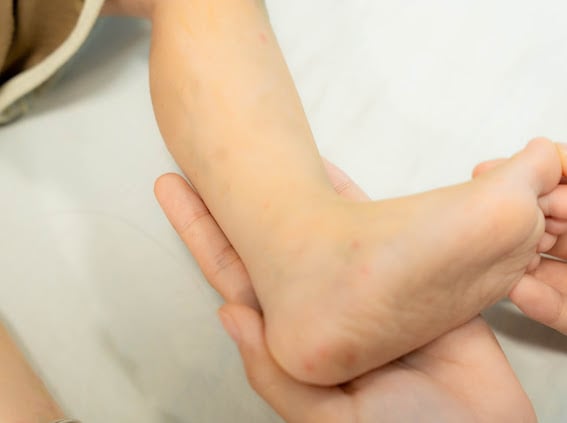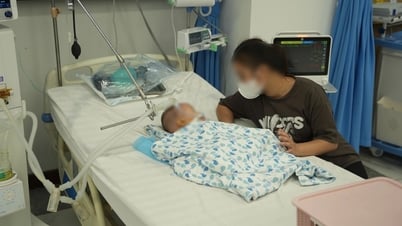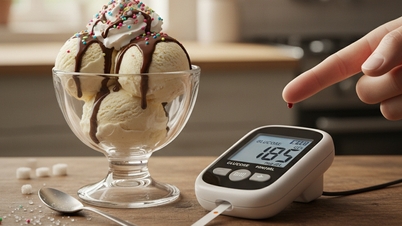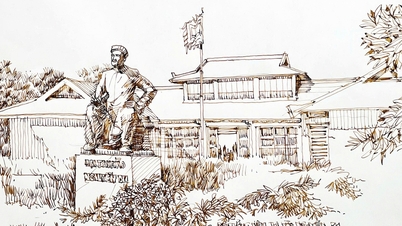Hand, foot and mouth disease can cause dangerous complications.
According to the Hanoi Center for Disease Control, since the beginning of the year, Hanoi has had 56 outbreaks of hand, foot and mouth disease; 126 wards and communes have cases. The city has recorded 4,000 cases of hand, foot and mouth disease in the past 8 months, an increase compared to the same period in 2024 (with 1,909 cases).

Children with mild hand, foot and mouth disease need to be monitored and cared for at home.
PHOTO: PHAM THAO
At some hospitals in Hanoi, doctors said they have recorded children with hand, foot and mouth disease brought in by their families for examination.
According to Dr. Nguyen Sy Duc, Department of Infectious Diseases, Hanoi Children's Hospital, the group of children with hand, foot and mouth disease are mostly children under 3 years old.
In fact, most cases of hand, foot and mouth disease are only recorded in young children, Dr. Duc explained, hand, foot and mouth disease is almost never found in adults due to natural immunity (as adults are often infected with the virus that causes hand, foot and mouth disease since childhood, even though they may not show symptoms), so they have protective antibodies.
Dr. Khoa also noted that adults can transmit hand, foot and mouth disease to children, even if they do not have obvious symptoms themselves. Adults can be infected with the virus and carry the pathogen in their bodies, called healthy carriers. The virus can exist in feces, nasal and throat secretions, saliva... and be transmitted to children through close contact (hugging, kissing, caring for children) when hands are not washed thoroughly after changing diapers, going to the toilet).
Adults can also get hand, foot and mouth virus from children. but rare and usually very mild or no symptoms. When adults are infected, they may have mild mouth ulcers, blisters on the hands and feet (very rare). Symptoms are mild and usually resolve on their own, without the need for specific treatment. Thanks to that, most adults do not get it again, or if they do, it is very mild, without obvious symptoms.
Doctors advise that to prevent hand, foot and mouth disease in children, families need to maintain personal hygiene and the environment: wash children's hands regularly with soap before eating, after going to the toilet, after playing; cut nails short, keep clean; clean toys, utensils, floors, toilets regularly... Children need to eat nutritious food, increase resistance; avoid contact with people suspected of having the disease.
Do not send children to school if they have signs of suspected hand, foot and mouth disease such as fever, mouth ulcers, blisters on the palms of the hands, feet, or buttocks. and notice Tell the school if your child has been diagnosed with hand, foot and mouth disease.
Children need to be taken to a medical facility immediately if they have a high fever, or rapid breathing, difficulty breathing, restlessness, convulsions...
According to the Department of Disease Prevention, Ministry of Health , everyone is susceptible to the virus that causes hand, foot, and mouth disease, but not everyone infected with the virus shows symptoms of the disease. The disease is common in children under 15 years old, especially children under 5 years old have a higher rate of infection.
Disease prevention in kindergarten: ensure hygiene; wash hands before and after cooking, preparing food, and after using the toilet.
Source: https://thanhnien.vn/canh-bao-nguy-co-tre-lay-benh-tay-chan-mieng-tu-nguoi-lon-185250912062358697.htm




![[Photo] General Secretary To Lam chairs the meeting of the Central Steering Committee on preventing and combating corruption, waste and negativity](https://vphoto.vietnam.vn/thumb/1200x675/vietnam/resource/IMAGE/2025/9/29/fb2a8712315d4213a16322588c57b975)






























































































Comment (0)